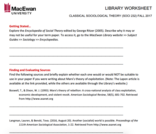
Worksheet used for a second-year sociology class on researching classical sociological theory. Students are asked to find and evaluate academic sources including books, articles and subject encyclopedias, and review APA citation style.

Worksheet used for a second-year sociology class on researching classical sociological theory. Students are asked to find and evaluate academic sources including books, articles and subject encyclopedias, and review APA citation style.

How do individuals and families interface with larger systems, and how do therapists intervene collaboratively? How do larger systems structure the lives of individuals and families? Relationally-trained practitioners are attempting to answer these questions through collaborative and interdisciplinary, team-focused projects in mental health, education, the law, and business, among other fields. Similarly, scholars and researchers are developing specific culturally responsive models: outreach family therapy, collaborative health care, multi-systemic school interventions, social-justice-oriented and spiritual approaches, organizational coaching, and consulting, among others. This course explores these developments and aims at developing a clinical and consulting knowledge that contributes to families, organizations, and communities within a collaborative and social-justice-oriented vision.

What does it mean to belong to a country? Can events change what that means? This interactive compares two paintings by John Lewis Krimmel. Both show people in Philadelphia’s Centre Square celebrating the Fourth of July, but one was painted in 1812, just after the United States had declared war on Great Britain, and the other was painted in 1819, four years after the war had ended. The two look very different, reflecting changing ideas. This "Genial.ly" presentation includes interactive annotations and a juxtapose slider--the final slide includes suggestions on how to help students use the art as historical evidence. If you evaluate or use this resource, please respond to this short (4 question) survey here bit.ly/3ofUImf
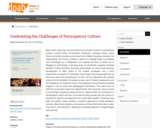
Many teens today who use the Internet are actively involved in participatory cultures—joining online communities (Facebook, message boards, game clans), producing creative work in new forms (digital sampling, modding, fan videomaking, fan fiction), working in teams to complete tasks and develop new knowledge (as in Wikipedia), and shaping the flow of media (as in blogging or podcasting). A growing body of scholarship suggests potential benefits of these activities, including opportunities for peer-to-peer learning, development of skills useful in the modern workplace, and a more empowered conception of citizenship. Some argue that young people pick up these key skills and competencies on their own by interacting with popular culture; but the problems of unequal access, lack of media transparency, and the breakdown of traditional forms of socialization and professional training suggest a role for policy and pedagogical intervention. This report aims to shift the conversation about the "digital divide" from questions about access to technology to questions about access to opportunities for involvement in participatory culture and how to provide all young people with the chance to develop the cultural competencies and social skills needed. Fostering these skills, the authors argue, requires a systemic approach to media education; schools, afterschool programs, and parents all have distinctive roles to play.

Central to our era is the gradual movement of all the world's regions toward a uniform standard of economic and political development. In this class we will read a variety of recent narratives that partake of, dissent from, or contribute to this story, ranging from novels and poems to World Bank and IMF statements and National Geographic reports. We will seek to understand the many motives and voices – sometimes congruent, sometimes clashing – that are currently engaged in producing accounts of people in the developing world: their hardships, laughter, and courage, and how they help themselves and are helped by outsiders who may or may not have philanthropic motives. Readings will include literature by J. G. Ballard, Jamaica Kincaid, Rohinton Mistry, and John le Carré, as well as policy documents, newspaper and magazine articles, and the Web sites of a variety of trade and development commissions and organizations.
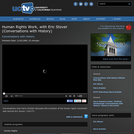
Conversations host Harry Kreisler discusses the evolution of the human rights movement with activist Eric Stover. (53 min)
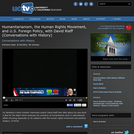
UC Berkeley's Harry Kreisler interviews author David Rieff who talks about his new book A Bed for the Night which analyzes the evolution of humanitarian work in international affairs focusing especially on its relations with the human rights movement and political leaders. (58 min)
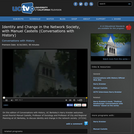
On this edition of Conversations with History, UC BerkeleyŐs Harry Kreisler welcomes social theorist Manuel Castells, Professor of Sociology and Professor of City and Regional Planning at UC Berkeley, to discuss identity and change in the network society. (58 min)
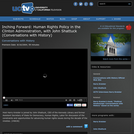
Host Harry Kreisler is joined by John Shattuck, CEO of the Kennedy Library and former Assistant Secretary of State for Democracy, Human Rights, Labor for discussion of the constraints and opportunities for advancing human rights issues during the decade of the nineties. (59 min)

UC Berkeley's Harry Kreisler welcomes UCLA sociologist Michael Mann for a conversation on how comparative historical sociology can help in our understanding of U.S. foreign policy. (56 min)
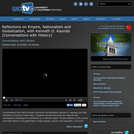
Conversations host Harry Kreisler welcomes His Excellency Kenneth D. Kaunda, the First President of Zambia (1964-1991). President Kaunda discusses the national and international challenges he confronted as a national leader. He also reflects on his current work with NGOs in the global fight to fight disease, poverty and inequality. (54 minutes)
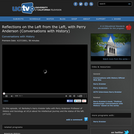
On this episode, UC BerkeleyŐs Harry Kreisler talks with Perry Anderson Professor of History and Sociology at UCLA about his intellectual journey and the status of the left. 58 min)
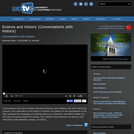
Conversations host Harry Kreisler welcomes historian John Heilbron, the 2007 Hitchcock Lecturer, for a discussion of the history of science. He reflects on his contributions to the field, analyzes the challenges of studying science as a historian, and offers insight into the value of science history for society. John Heilbron also discusses his years as Vice Chancellor of the Berkeley campus. (51 minutes)
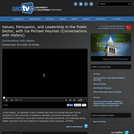
In this edition, UC Berkeley's Harry Kreisler talks with Ira Michael Heyman, former Chancellor of the University of California, Berkeley and former Secretary of the Smithsonian Institution. Chancellor Heyman discusses leadership, the challenges facing higher education and the problems of managing public museums. (58 min)

Classicist and columnist Victor Davis Hanson talks with UC Berkeley's Harry Kreisler about the classics, war, and what we stand for in the post-9/11 world. (56 min)
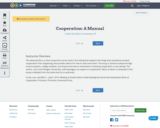
The attached file is a short essay that can be read in one sitting that explains the things that sometimes prevent cooperation from happening and provides advice for how to overcome them. The essay is aimed at advanced high school students, college students, and anyone else who is interested in fostering cooperation in any setting. The author, Lee Cronk (Rutgers University, anthropology) is an expert on cooperation. Much of what is contained in this essay is distilled from this book that he co-authored:Cronk, Lee, and Beth L. Leech. 2013. Meeting at Grand Central: Understanding the Social and Evolutionary Roots of Cooperation. Princeton: Princeton University Press.
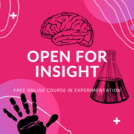
This is an online course in experimentation as a method of the empirical social sciences, directed at science newcomers and undergrads. We cover topics such as:
- How do we know what’s true?
- How can one recognize false conclusions?
- What is an experiment?
- What are experiments good for, and what can we learn from them?
- What makes a good experiment and how can I make a good experiment?
The aim of the course is to illustrate the principles of experimental insight. We also discuss why experiments are the gold standard in empirical social sciences and how a basic understanding of experimentation can also help us deal with questions in everyday life.
But it is not only exciting research questions and clever experimental set-ups that are needed for experiments to really work well. Experiments and the knowledge gained from them should be as freely accessible and transparent as possible, regardless of the context. Only then can other thinkers and experimenters check whether the results can be reproduced. And only then can other thinkers and experimenters build their own experiments on reliable original work. This is why the online course Open for Insight also discusses how experiments and the findings derived can be developed and communicated openly and transparently.
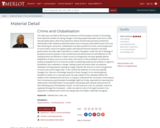
This video was recorded at 9th Annual Conference of the European Society of Criminology. Post-industrial societies are facing changes in the way people internalize social norms, what they feel guilty about, when they experience shame and how they perceive punishment. Identification with traditional authorities which have in the past transmitted social norms has been declining for some time. Individualism has been pushed to its limits. And transgression of norms which comes from global capital, international financial institution and state governments has often been cherished as a matter of progress. Under the veil of ideology of perpetual economic growth on the societal level and advancement of self-fulfilment on the individual level, the definition of what counts as transgression has been globally altered. Redefinition of what counts as a limit, what is the nature of the prohibition and what are publicly acceptable forms of remorse as well as individually experienced anxieties in regard to prohibitions also underwent a change. Feeling of guilt and shame often accompanies individual's striving towards creating an image of perfect life and not so much transgression of moral rules and the legal order. In this context the definition of crime has radically changed, too. How can criminology respond to these changes? As an interdisciplinary discipline it needs to in a new way assess the way malaise of the civilization affects the malaise of the individual and vice versa. In trying to understand this connection, some lessons from contemporary psychoanalytic knowledge might be of help, especially the reasoning that utilitarianism ultimately failed in its perception that people work towards advancement of their well being and minimalization of pain. Current economic crisis, for example, cannot be explained through this framework – rather we need to look at it through the prism of an enjoyment in selfdestruction which has always been the hidden underside of progress.
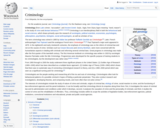
This resource is of Wikipedia discusses on the historical aspects of Criminology , Different Schools of Criminological Thoughts including Sociological,Psychological, Marxism Theories, Labelling Theories, Routine Activity Theory, Biologilcal thoeries .
This source also discusses the definition and types of Crime.
Thus , the Wikipedia is the original source, it is shared in this OER platform to share the insights on Criminology to many of the people. Hence, I deserve no right on this resource , other than sharing it.

The goal of this seminar is to have open discussions of controversial political and social issues and raise awareness of current world events in an informal setting. Discussions for the first part of each class will focus on current events from that week, while in the second part of class students will discuss a scheduled issue in greater detail. Scheduled issues include the wars in Iraq and Afghanistan, the regulation of marijuana, how our society should punish criminals, genocide in Rwanda and Sudan, discrimination in our society today, the future of social security, whether pornography is sexist, and where we can go from here in the Arab/Israeli Conflict. Discussions will be supplemented by readings, films, and public speakers. Students will also be encouraged to read news media from around the world.